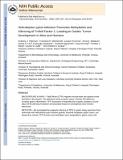Helicobacter pylori Infection Promotes Methylation and Silencing of Trefoil Factor 2, Leading to Gastric Tumor Development in Mice and Humans
Author(s)
Peterson, Anthony J.; Menheniott, Trevelyan R.; O'Connor, Louise; Walduck, Anna K.; Fox, James G.; Kawakami, Kazuyuki; Minamoto, Toshinari; Ong, Eng Kok; Wang, Timothy C.; Judd, Louise M.; Giraud, Andrew S.; ... Show more Show less
DownloadFox_Helicobacter Pylori.pdf (5.449Mb)
PUBLISHER_CC
Publisher with Creative Commons License
Creative Commons Attribution
Terms of use
Metadata
Show full item recordAbstract
Background & Aims
Trefoil factors (TFFs) regulate mucosal repair and suppress tumor formation in the stomach. Tff1 deficiency results in gastric cancer, whereas Tff2 deficiency increases gastric inflammation. TFF2 expression is frequently lost in gastric neoplasms, but the nature of the silencing mechanism and associated impact on tumorigenesis have not been determined.
Methods
We investigated the epigenetic silencing of TFF2 in gastric biopsy specimens from individuals with Helicobacter pylori-positive gastritis, intestinal metaplasia, gastric cancer, and disease-free controls. TFF2 function and methylation were manipulated in gastric cancer cell lines. The effects of Tff2 deficiency on tumor growth were investigated in the gp130[superscript F/F] mouse model of gastric cancer.
Results
In human tissue samples, DNA methylation at the TFF2 promoter began at the time of H pylori infection and increased throughout gastric tumor progression. TFF2 methylation levels were inversely correlated with TFF2 messenger RNA levels and could be used to discriminate between disease-free controls, H pylori-infected, and tumor tissues. Genome demethylation restored TFF2 expression in gastric cancer cell lines, so TFF2 silencing requires methylation. In Tff2-deficient gp130[superscript F/F]/Tff2[superscript −/−] mice, proliferation of mucosal cells and release of T helper cell type-1 (Th-1) 1 cytokines increased, whereas expression of gastric tumor suppressor genes and Th-2 cytokines were reduced, compared with gp130[superscript F/F]controls. The fundus of gp130[superscript F/F]/Tff2[superscript −/−] mice displayed glandular atrophy and metaplasia, indicating accelerated preneoplasia. Experimental H pylori infection in wild-type mice reduced antral expression of Tff2 by increased promoter methylation.
Conclusions
TFF2 negatively regulates preneoplastic progression and subsequent tumor development in the stomach, a role that is subverted by promoter methylation during H pylori infection.
Date issued
2010-08Department
Massachusetts Institute of Technology. Department of Biological Engineering; Massachusetts Institute of Technology. Division of Comparative MedicineJournal
Gastroenterology
Publisher
Elsevier
Citation
Peterson, Anthony J., Trevelyan R. Menheniott, Louise O’Connor, Anna K. Walduck, James G. Fox, Kazuyuki Kawakami, Toshinari Minamoto, et al. “Helicobacter Pylori Infection Promotes Methylation and Silencing of Trefoil Factor 2, Leading to Gastric Tumor Development in Mice and Humans.” Gastroenterology 139, no. 6 (December 2010): 2005–2017.
Version: Author's final manuscript
ISSN
00165085
1528-0012